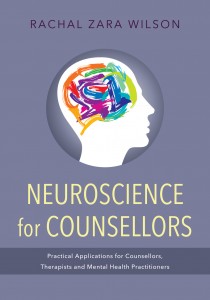Rachal Zara Wilson is a counsellor, social worker and author of the new Neuroscience for Counsellors. We caught up with her for a quick chat about the book and why she wanted to write about such a complex topic.
1. Who do you think would benefit from reading this book?
Definitely counsellors, but also any other therapists as well. The book is designed so that it has sections where the neuroscience is explained, and separate sections for counsellors and other therapists with suggestions on how to use this knowledge for the benefit of their clients in the session room.
Families of people who are experiencing mental health dysfunction may also be interested in the knowledge contained in this book, and also in the implications for how they can support their loved ones.
2. Why did you write this book? 
I’ve always been interested in neuroscience; the brain is so fascinating and amazing, and capable of so much more than we’ve always been led to believe. And of course, as a counsellor working with people, how the brain works has always been top of my mind. The final motivator was having a child who was experiencing problems with their mental health, and I guess I just hoped to find something that would help him and others in a similar situation during the course of my research.
3. So what’s so exciting about what you learned?
Probably the most exciting thing would be the brain’s capacity to change itself, known as brain plasticity. The brain isn’t static, it’s more like a dynamic organ that is constantly changing for better or worse. And what we do plays a huge part in how it changes. How much stress we’re under, what we eat, the quality of our sleep, whether we exercise and how much, our living environments, and the presence or absence of early trauma in our lives are some of the things that contribute to the way our brain functions, and to its capacity for change, or plasticity. I guess the most exciting thing is that we have control over this plasticity to a large degree, and we can therefore improve the quality of our brain function, our health and our lives.
4. Why don’t we know this stuff already?
Because neuroscience is a field in its infancy. There’s a lot of learning coming through, but much of it’s wrapped up in scientific jargon, making it inaccessible to those of us who are not scientists. And because there’s lots of different levels of looking at the brain, (both micro and macro,) different neuroscience specialties do not always integrate their specialist knowledge. I think the benefit of this book is that it integrates the neuroscience into an overall big picture, while also drawing on this resource to come up with practical ways for integrating it into therapy. It hasn’t been done before because it’s new, because it’s complex, and because integrating neuroscience with counselling and other therapies requires a knowledge of both fields. I believe that in the future, all practitioners providing talking therapies are going to need to understand what neuroscience offers our professions, or risk becoming irrelevant.
5. Why put it in a book?
This knowledge is meant to be shared. All counsellors and therapeutic practitioners want best outcomes for their clients, and the more knowledge we have that can help people make positive change in their lives, the better.
6. Is it complicated?
The neuroscience is complex, but the book is designed so that people who just want to know what it means for their practice can just read those sections, while those who want to understand how it all works can read up on the explanations for how all the scientific evidence fits together. The book is written in the plainest English possible, and there is a glossary and diagrams at the back to help you fit it all together.
You can find out more about the book, read reviews and order your copy here.